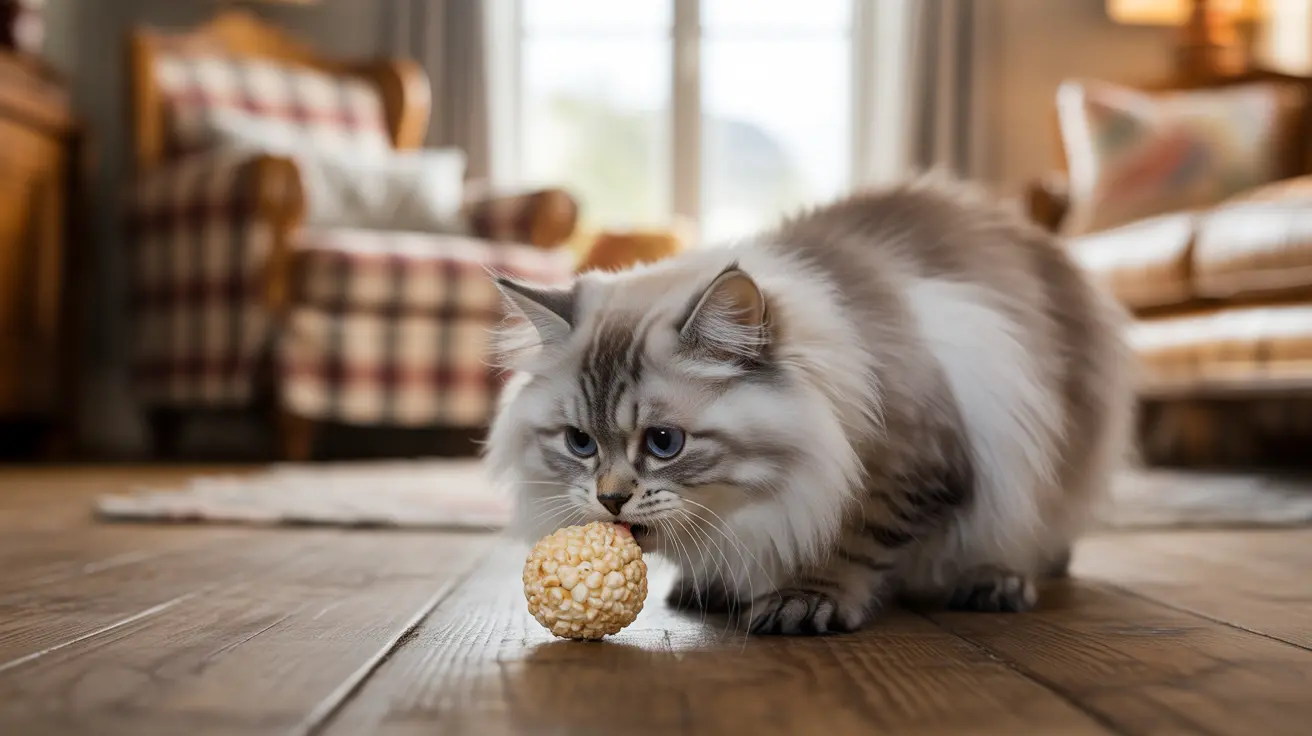As cat owners, we often wonder if sharing our favorite snacks with our feline friends is safe. Popcorn, a popular movie-night treat, frequently raises questions about its safety for cats. Let's explore whether popcorn poses any risks to our furry companions and what precautions you should take.
While plain, air-popped popcorn isn't toxic to cats, the relationship between cats and this common snack is more complicated than you might think. Understanding the potential risks and benefits can help you make informed decisions about sharing this treat with your pet.
The Basics of Cats and Popcorn Safety
Plain, air-popped popcorn without any seasonings or additives is technically safe for cats in small amounts. However, this doesn't mean it should become a regular part of your cat's diet. Cats are obligate carnivores, meaning their bodies are designed to process and utilize nutrients primarily from meat sources.
The real dangers often come from how we typically prepare and consume popcorn. Buttered, salted, or flavored varieties can pose significant health risks to your feline companion.
Potential Risks of Feeding Popcorn to Cats
Physical Hazards
Unpopped kernels present a serious choking hazard for cats. These hard kernels can also damage your cat's teeth or become lodged in their digestive tract. Even partially popped kernels, often found at the bottom of the bowl, can be dangerous.
Seasoning and Topping Dangers
Common popcorn toppings can be harmful or even toxic to cats:
- Butter and oils can cause digestive upset and contribute to obesity
- Salt may lead to sodium poisoning
- Garlic or onion seasonings are toxic to cats
- Caramel and other sweet toppings can contain xylitol, which is dangerous for pets
- Cheese flavorings often contain artificial ingredients that cats shouldn't consume
Nutritional Considerations
Popcorn offers virtually no nutritional benefits for cats. While it contains some fiber and carbohydrates, cats' digestive systems aren't designed to process these nutrients effectively. Their dietary needs are better met through:
- High-quality commercial cat food
- Protein-rich treats designed specifically for cats
- Veterinarian-approved supplements when necessary
Safe Practices If Your Cat Shows Interest in Popcorn
If your cat seems curious about popcorn, follow these guidelines:
- Only offer plain, air-popped popcorn
- Limit portions to one or two pieces occasionally
- Always supervise your cat while they investigate the popcorn
- Remove any unpopped kernels
- Never use popcorn as a regular treat or food replacement
Better Alternatives to Popcorn
Instead of sharing popcorn with your cat, consider these safer alternatives:
- Commercial cat treats formulated for feline nutrition
- Small pieces of cooked, plain chicken or turkey
- Freeze-dried meat treats specifically made for cats
- Cat grass for safe plant-based enrichment
Frequently Asked Questions
Is plain, air-popped popcorn safe for cats to eat?
Yes, plain, air-popped popcorn is generally safe for cats in very small amounts, but it offers no nutritional benefits and should not be a regular treat.
What are the risks of feeding flavored or buttered popcorn to my cat?
Flavored or buttered popcorn can cause digestive issues, sodium poisoning from salt, and potential toxicity from ingredients like garlic or onion powder. The added fats can also contribute to obesity.
Can popcorn cause choking or digestive problems in cats?
Yes, unpopped kernels pose a significant choking hazard, and large amounts of popcorn can cause digestive upset, including constipation or diarrhea.
Does popcorn provide any nutritional benefits for cats?
No, popcorn provides virtually no nutritional benefits for cats. As obligate carnivores, cats require nutrients found in meat-based foods.
How should I safely offer popcorn to my cat, if at all?
If you choose to offer popcorn, only provide plain, air-popped popcorn in very small amounts, removing all unpopped kernels, and always supervise your cat while they eat it.
Conclusion
While plain popcorn isn't inherently toxic to cats, it's best to avoid sharing this snack with your feline friend. The potential risks outweigh any minimal benefits, and there are many safer, more nutritious treats available specifically designed for cats. Focus on providing your cat with a balanced, species-appropriate diet and treats that support their health and well-being.






